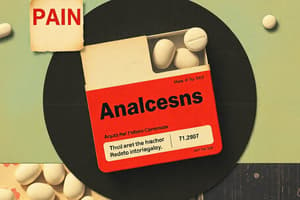Podcast
Questions and Answers
Acetaminophen provides similar pain relief and fever reduction as COX-1 and COX-2 inhibitors. What is a key difference that makes acetaminophen a preferred choice in certain situations?
Acetaminophen provides similar pain relief and fever reduction as COX-1 and COX-2 inhibitors. What is a key difference that makes acetaminophen a preferred choice in certain situations?
- Acetaminophen has a longer duration of action compared to traditional COX inhibitors.
- Acetaminophen has stronger anti-inflammatory effects compared to COX inhibitors.
- Acetaminophen provides peripheral inhibition, which enhances its pain-relieving properties.
- Acetaminophen does not significantly affect the gastric mucosa or platelets, reducing the risk of gastric ulcers and cardiovascular events. (correct)
Why does acetaminophen lack anti-inflammatory and anticoagulant effects?
Why does acetaminophen lack anti-inflammatory and anticoagulant effects?
- It contains anti-inflammatory agents, thus negating the need for COX inhibition.
- It enhances platelet aggregation, preventing anticoagulant effects.
- Its inhibition of COX enzymes is limited to the central nervous system (CNS). (correct)
- It primarily inhibits COX enzymes in peripheral tissues.
Which of the following adverse effects is most associated with long-term, high-dose acetaminophen use?
Which of the following adverse effects is most associated with long-term, high-dose acetaminophen use?
- Liver damage (correct)
- Cardiovascular events, such as myocardial infarction
- Gastric ulcer formation
- Increased risk of bleeding
A patient is suspected of acetaminophen overdose. Which intervention is the priority?
A patient is suspected of acetaminophen overdose. Which intervention is the priority?
What is the maximum recommended daily dose of acetaminophen for adults and children over 12 years to avoid toxicity?
What is the maximum recommended daily dose of acetaminophen for adults and children over 12 years to avoid toxicity?
Why must caregivers exercise caution when administering acetaminophen drops to infants?
Why must caregivers exercise caution when administering acetaminophen drops to infants?
A client who regularly takes acetaminophen, particularly a woman, should have which parameter monitored regularly?
A client who regularly takes acetaminophen, particularly a woman, should have which parameter monitored regularly?
A patient is taking multiple over-the-counter medications for cold symptoms. What advice should the nurse provide regarding acetaminophen?
A patient is taking multiple over-the-counter medications for cold symptoms. What advice should the nurse provide regarding acetaminophen?
A client regularly takes acetaminophen for chronic pain. What guidance should the nurse provide to ensure safe usage and minimize the risk of liver toxicity?
A client regularly takes acetaminophen for chronic pain. What guidance should the nurse provide to ensure safe usage and minimize the risk of liver toxicity?
A client with a history of heavy alcohol use is prescribed acetaminophen for a headache. What is the primary concern regarding this medication order?
A client with a history of heavy alcohol use is prescribed acetaminophen for a headache. What is the primary concern regarding this medication order?
A parent is administering acetaminophen to their child for a fever. Which instruction is most crucial for the nurse to emphasize to ensure accurate dosing?
A parent is administering acetaminophen to their child for a fever. Which instruction is most crucial for the nurse to emphasize to ensure accurate dosing?
A client taking warfarin for anticoagulation is also prescribed acetaminophen for pain relief. What potential interaction should the healthcare provider monitor for?
A client taking warfarin for anticoagulation is also prescribed acetaminophen for pain relief. What potential interaction should the healthcare provider monitor for?
A client reports taking acetaminophen for a headache along with an over-the-counter cold medication. Which question is most important for the nurse to ask to assess the risk of toxicity?
A client reports taking acetaminophen for a headache along with an over-the-counter cold medication. Which question is most important for the nurse to ask to assess the risk of toxicity?
Which statement best describes how cholestyramine affects acetaminophen absorption?
Which statement best describes how cholestyramine affects acetaminophen absorption?
A client arrives at the emergency room immediately following an acetaminophen overdose. Which medication should the nurse prepare to administer?
A client arrives at the emergency room immediately following an acetaminophen overdose. Which medication should the nurse prepare to administer?
Which of the following findings would indicate that a client is experiencing acetaminophen toxicity?
Which of the following findings would indicate that a client is experiencing acetaminophen toxicity?
Flashcards
Acetaminophen
Acetaminophen
Pain reliever and fever reducer, toxic to the liver in high doses.
Acetaminophen Daily Limit
Acetaminophen Daily Limit
Maximum daily dose of acetaminophen for adults to avoid liver toxicity.
Toxic Hepatitis
Toxic Hepatitis
Liver damage and scarring from excessive acetaminophen intake.
Acetaminophen Overdose Symptoms
Acetaminophen Overdose Symptoms
Signup and view all the flashcards
Alcohol Use Disorder & Acetaminophen
Alcohol Use Disorder & Acetaminophen
Signup and view all the flashcards
Warfarin and Acetaminophen
Warfarin and Acetaminophen
Signup and view all the flashcards
Cholestyramine
Cholestyramine
Signup and view all the flashcards
Acetylcysteine
Acetylcysteine
Signup and view all the flashcards
Acetaminophen's Action
Acetaminophen's Action
Signup and view all the flashcards
Acetaminophen Adverse Effects
Acetaminophen Adverse Effects
Signup and view all the flashcards
Overdose Monitoring
Overdose Monitoring
Signup and view all the flashcards
Acetaminophen Overdose Treatment
Acetaminophen Overdose Treatment
Signup and view all the flashcards
Blood Pressure Monitoring
Blood Pressure Monitoring
Signup and view all the flashcards
Infant Dosage
Infant Dosage
Signup and view all the flashcards
Combination Products
Combination Products
Signup and view all the flashcards
Study Notes
- Acetaminophen is a nonopioid analgesic used to treat mild to moderate pain and reduce fever.
- Acetaminophen offers similar benefits to COX-1 and COX-2 inhibitors.
- It does not typically cause serious adverse reactions when taken in therapeutic doses.
Expected Pharmacologic Action
- Acetaminophen is a COX inhibitor that primarily affects the CNS.
- It effectively alleviates pain and reduces fever.
- It lacks anti-inflammatory or anticoagulant effects due to limited peripheral inhibition.
- It poses a lower risk of gastric ulcers and cardiovascular events because it does not adversely affect the gastric mucosa or platelets.
Adverse Drug Reactions
- Liver damage can occur with toxic doses taken over extended periods.
- Hypertension, particularly in women, can result from daily use.
Interventions
- Monitor for early signs of overdose or poisoning, including abdominal discomfort, nausea, vomiting, diaphoresis, and diarrhea.
- Liver damage can occur 48-72 hours post overdose.
- Administer acetylcysteine orally or intravenously to reverse overdose and minimize liver injury.
- Regularly monitor blood pressure in clients, especially women, who take acetaminophen regularly.
Administration
- Can be administered orally or rectally.
- Adults and children over 12 should not exceed 4g daily.
- Base children's dosage on manufacturer guidelines related to age and weight.
- Concentrated acetaminophen drops are available for infants and administered via a dropper, typically less than 1 mL.
- Caution clients about the presence of acetaminophen in many combination products, like cold preparations, to avoid overdose.
Safety Alert
- Instruct clients about the dangers of acetaminophen toxicity.
- Over-the-counter medications can be lethal in large amounts.
- Acetaminophen is highly toxic to the liver when exceeding 4g per day.
- Combination cold medications often contain acetaminophen.
- Toxic doses can cause hepatitis and liver damage, potentially leading to liver failure.
Client Instructions
- Adults and children over 12 should not exceed 4 grams per day.
- Infants and children under 12 should adhere to the manufacturer's recommended dose based on age and weight.
- Report any abdominal discomfort, nausea, vomiting, diaphoresis, or diarrhea immediately as signs of possible overdose.
- Encourage regular blood pressure checks, especially for women.
Contraindications and Precautions
- Clients with alcohol use disorder should avoid acetaminophen due to the increased risk of liver damage.
- Use caution in clients with anemia, immune suppression, and hepatic or renal disease.
Interactions
- Alcohol increases the risk of liver injury when combined with high doses of acetaminophen.
- Concurrent use with warfarin increases bleeding risk.
- Cholestyramine reduces acetaminophen absorption.
Question Answer
- Acetylcysteine should be administered in the event of an acetaminophen overdose.
Studying That Suits You
Use AI to generate personalized quizzes and flashcards to suit your learning preferences.




